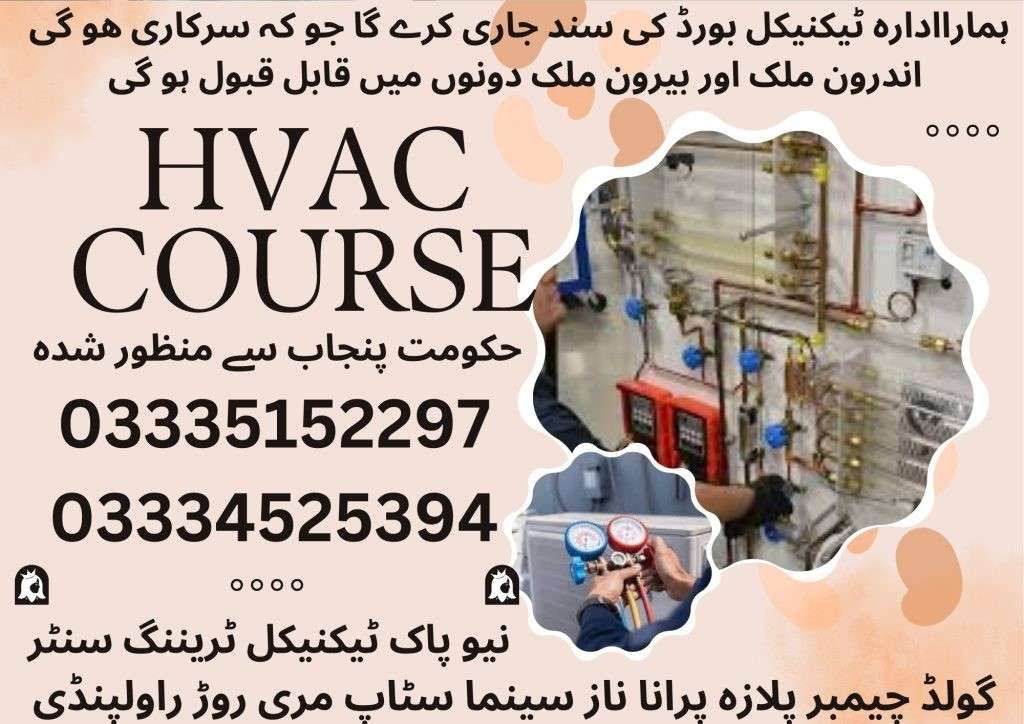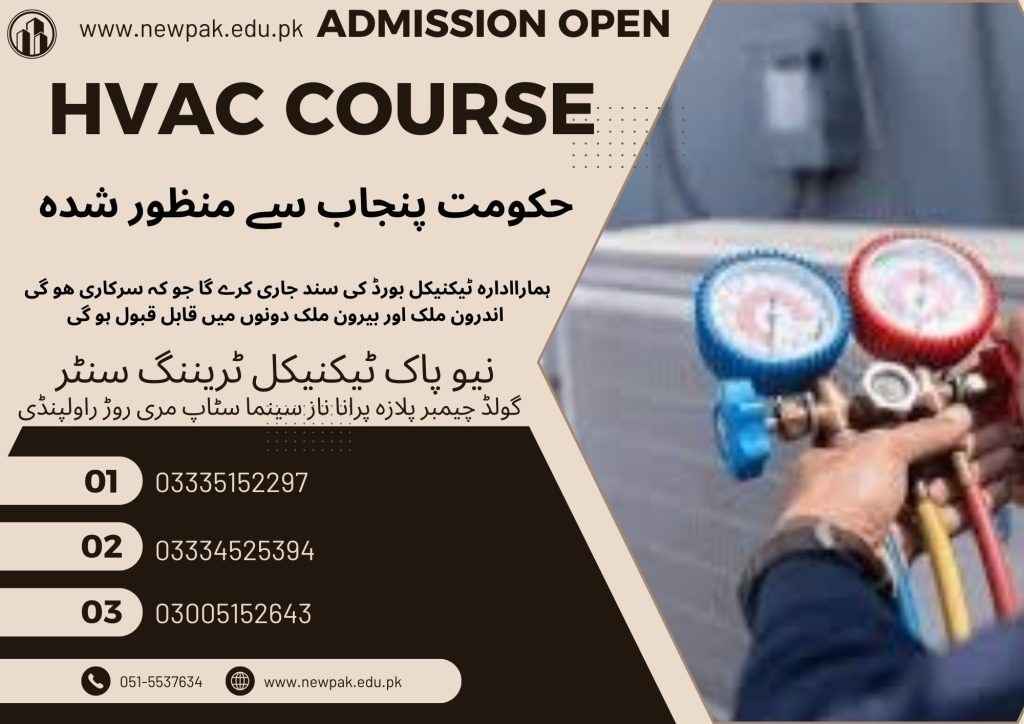
HVAC Course In Rawalpindi Islamabad
Safety rules, procedures, and PPE form the core of HVAC. This HVAC technician training course begins with Heating, Ventilation, Air Conditioning, and Refrigeration system basics, followed by electrical theory, refrigeration components, and system operations. Students explore commercial and domestic refrigeration, brazing, soldering, HVAC controls, and troubleshooting. Practical exercises simulate real scenarios. Advanced topics include electrical systems, refrigeration optimisation, hydronic systems, air distribution, system design, building automation, solar thermal systems, and green practices.
Course Overview
The 6-month HVAC training course covers fundamentals like safety, system overviews, electrical basics, refrigeration, air conditioning, controls, and troubleshooting. Hands-on labs let students simulate field scenarios with real equipment. The HVAC 1 year program adds modules on electricity, refrigeration, hydronics, air distribution, HVAC design, automation, specialty systems, and advanced troubleshooting. Internship options offer real-world exposure. Graduates are ready to work professionally in the HVAC industry.

Course Duration
06 | Months
- Safety & PPE Procedures
- Introduction to HVACR Systems
- Electrical Fundamentals
- Refrigeration Cycle & Components
- Air Conditioning Systems
- Refrigeration Systems (Domestic & Commercial)
- Brazing and Soldering Techniques
- HVAC Controls & Thermostats
- Troubleshooting Basics
- Practical Hands-on Labs
01 | Year
- Safety & PPE Procedures
- Introduction to HVACR Systems
- Electrical Fundamentals
- Refrigeration Cycle & Components
- Air Conditioning Systems
- Refrigeration Systems (Domestic & Commercial)
- Brazing and Soldering Techniques
- HVAC Controls & Thermostats
- Troubleshooting Basics
- Practical Hands-on Labs
- Advanced Electrical Components
- Advanced Refrigeration & Optimization
- Hydronic Heating Systems
- Air Distribution Design & Installation
- HVAC System Design & Load Calculations
- Building Automation Systems (BAS)
- Specialty Topics (Solar, Green Practices, etc.)
- Advanced System Troubleshooting
- Internship / Field Experience (Optional)
Course Outline (6 Months)
Safety and Introduction to HVAC
Month 1
- Safety regulations, procedures, and use of personal protective equipment (PPE)
- An overview of Heating, Ventilation, Air Conditioning, and Refrigeration systems
Electrical and Refrigeration Basics
Month 2
- Basic electrical theory, components, diagrams, and troubleshooting
- The science behind refrigeration, components (compressors, condensers, evaporators, expansion devices), and their functions
Air Conditioning Systems
Month 3
- Types of air conditioning systems (split units, window units, central air conditioners)
- Installation, operation, and maintenance
Refrigeration Systems and Pipe Work
Month 4
- Commercial and domestic refrigeration systems (walk-in coolers, freezers, refrigerators)
- Components and troubleshooting
- Safe handling and techniques for brazing and soldering copper pipes used in HVAC systems
HVAC Controls and Troubleshooting
Month 5
- Thermostats, relays, and other control systems used in HVAC equipment
- Techniques used to diagnose and troubleshoot common problems in HVAC systems, HVAC course
Practical Hands-on Labs
Month 6
- Apply the learned knowledge through practical exercises on trainers and equipment
- Simulating real-world scenarios
Course Outline (1-Year)
Months 1–6: Basic HVAC Course In Rawalpindi Islamabad
(Same course content as the 6-month program but with more detail, role-plays, software demos, and assessments.)
Advanced Electricity Systems
Month 7
- In-depth study of electrical components used in HVAC systems
- Motors, transformers, and electrical control circuits, including HVAC training
Advanced Refrigeration Techniques
Month 8
- Advanced refrigeration theory
- System optimization and troubleshooting complex refrigeration issues
Hydronics and Heating Systems
Month 9
- Hydronic heating systems (boilers, pumps, piping), their operation and maintenance, HVAC course
- Design and installation of ductwork, air handlers, and other components responsible for air distribution within a building
HVAC Design and Automation
Month 10
- Basics of HVAC system design, considering factors like building load calculations and equipment selection
- Introduction to Building Automation Systems used to control and monitor HVAC equipment in the HVAC course
Specialty Areas in HVAC
Month 11
- Solar thermal systems
- Green building practices in HVAC classes
- Commercial refrigeration
Troubleshooting and Internship
Month 12
- Troubleshooting complex system malfunctions through practical scenarios
- Internship (Optional): Gain real-world experience under the supervision of qualified professionals

Career Opportunities
- HVAC Technician
- Refrigeration Mechanic
- Building Automation Technician
- HVAC Design Engineer
- HVAC Service Supervisor
Conclusion
This HVAC Course in Rawalpindi Islamabad, combines foundational knowledge with practical skills, making it ideal for those pursuing a career in this field. From safety protocols to advanced system design, the course ensures hands-on experience and industry readiness. With real-world training, in-depth air conditioning classes, and specialized HVAC tech classes, graduates are fully prepared to succeed in the industry after this comprehensive HVAC technician course.

